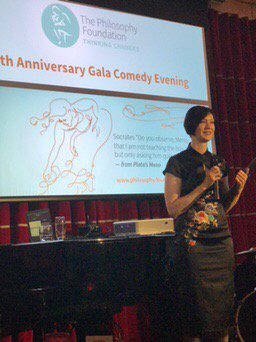Can Philosophy for Children Stop Trump?
Can teaching philosophy to children prevent another Trump from being elected, or even created in the future? Andy West, a specialist philosophy teacher at The Philosophy Foundation delves into the question... thinking about the history of how we got to where we are now, and also his own experience of doing philosophy with children. His answer may surprise you...
Posted by on 14th December 2017 at 12:00am
Category: Philosophy, P4C, Education
Welcome address to The Philosophy Foundation's 10 Year Anniversary event
Read Emma Worley's opening address at our 10 year Anniversary event on September 20th 2017. The event was used to raise money for our work with children in care in Brent, as part of our Korczak / Hoffman project, as well as a celebration of 10 years of working as an organisation.
Posted by on 4th October 2017 at 12:00am
Category: Philosophy
Korczak/Hoffman Project
We would like to use the opportunity of celebrating our 10 Year Anniversary to raise funds to work with children in care, and those coming out of care. We are calling this the Korczak/Hoffman Project after the people who inspired it.
Posted by on 8th September 2017 at 12:00am
Category: Philosophy
World Poetry Day 2016
UNESCO marks World Poetry Day every year on the 21st March.
In celebrating World Poetry Day UNESCO recognises the unique ability of poetry to capture the creative spirit of the human mind.
The Philosophy Foundation use poetry to explore philosophy, and philosophy to explore poetry.
Posted by on 3rd March 2016 at 12:00am
Category: P4C, Philosophy, Poetry
Peter Worley | Why use stories for doing philosophy with children?
First of all stories engage. When a teller tells a story well the audiencevisualize the story so that it seems to happen before them. If you want children to think, first of all they must be engaged.
Secondly, stories enable children to grasp complex ideas very naturally, where in the abstract, they would be lost. Tell the story of ‘Scylla and Charybdis’ from The Odyssey and children can follow the complexities of ethical dilemmas that would be nigh on impossible for them in the abstract.
Thirdly, stories can be used to activate the children as moral agents. You can stop the story at the crisis point, the difficult decision or the conflict, and instead of simply reading on, you could ask the class questions: ‘What do you think [the character]should do?’, ‘What do you think [the character] will do?’, ‘What would you do?’ and ‘What do…
Posted by on 2nd February 2016 at 12:00am
Category: Education, P4C, Philosophy





